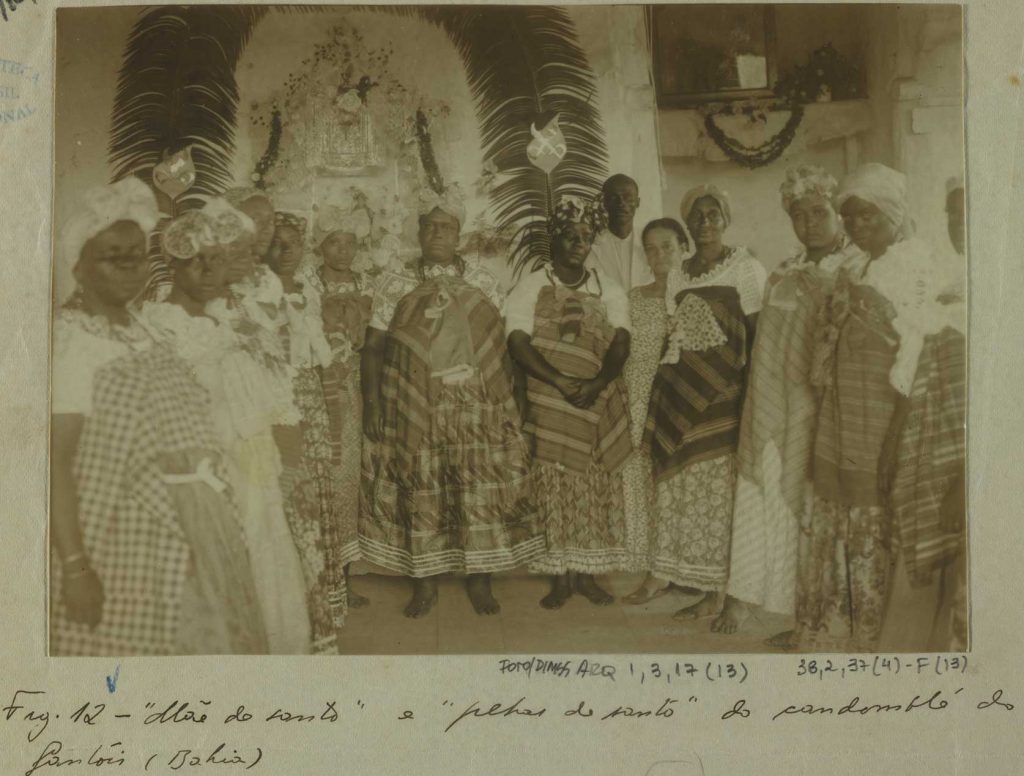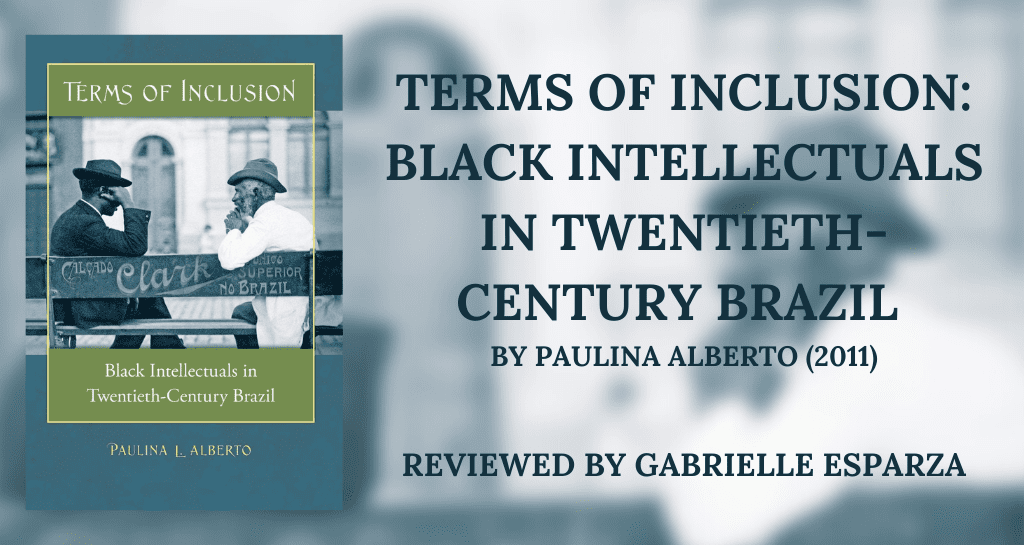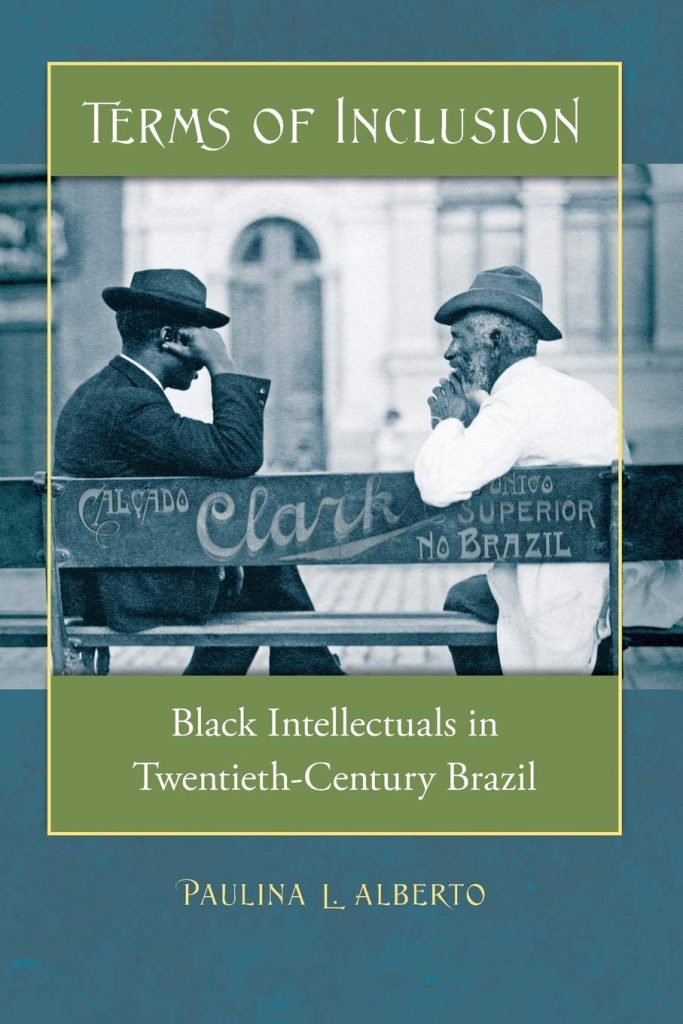Alberto, Paulina L. Terms of Inclusion: Black Intellectuals in Twentieth-Century Brazil. Chapel Hill, NC: University of North Carolina Press, 2011.
In Terms of Inclusion, Paulina Alberto traces the history of Black activism and thought in twentieth-century Brazil. She focuses on the urban centers of São Paulo, Rio de Janeiro, and Salvador da Bahia between the early 1900s and the mid-1980s while tracing the strategies that Black intellectuals used to shape discourses about race relations and to negotiate their citizenship. Over the course of the twentieth century, Black political thought and action changed as the possibilities for equality and inclusion shifted with developments in local, national, and international politics. Alberto frames the distinct political strategies applied by Black thinkers as part of a century-long struggle to influence and contest dominant ideologies of racial harmony.
Although Terms of Inclusion focuses on three influential urban centers, they do not all receive equal weight in the text. This is largely driven by the availability and depth of sources. São Paulo, home to a prolific Black press, receives the most attention throughout the study. The large written record left by Black intellectuals in São Paulo’s Black newspapers forms the bulk of Alberto’s documentary sources. She also uses these sources to indirectly access the voices of Black thinkers from Rio de Janeiro and Salvador da Bahia. Academic publications and government documents supplement records from São Paulo’s Black newspapers. By the 1940s, a smaller but influential Black press emerged in Rio de Janeiro. Alberto draws on these sources for the latter half of her study. Salvador da Bahia, which did not develop a strong Black press, receives briefer treatment throughout the text with a stronger focus on the Afro-Brazilian religion of Candomblé.
Because the depth and availability of sources differed in each city, Alberto does not take a strictly comparative approach. Instead, she tries to integrate these regional subplots into a broader national history of Black thought and activism during the twentieth century. In tracing this intellectual history, Alberto engages with scholarship on racial democracy and shows that Black intellectuals did not engage with this doctrine because of its truth but rather because of its potential to negotiate a more inclusive vision of citizenship. Racial democracy therefore represented a shared ideal that these thinkers and activists demanded the state make real.

Alberto develops her argument over six chronological chapters: foreigners (1900-1925); fraternity (1925-1929); nationals (1930-1945); democracy (1945-1950); differences (1950-1964); and decolonization (1964-1985). Each chapter represents a moment in Black Brazilian history and places it within the context of regional and national history. Through this structure, the book moves from the emergence of whitening discourses in the early republic to the doctrine of racial democracy during the 1940s and beyond. However, this organization decentralizes elite white voices and asks readers to consider how people of color engaged with and pushed against these dominant narratives of race relations in Brazil.
Although Terms of Inclusion follows a chronological narrative, it does not present a history of steady progress toward racial equality. Alberto traces how each period’s political circumstances shaped the demands and actions of Black intellectuals. Chapter four, democracy (1945-1950), outlines how Black thinkers used the expansion of freedoms of speech and association to form new organizations and publications. They also adopted the language of democracy and the law to advocate for their own inclusion. In contrast, the subsequent period between 1950 and 1964 provided less freedom to organize around racial identity and to denounce racial discrimination. Narratives of racial harmony and a growing perception of Brazil as a post-racial society had gained popularity in the wake of democratic governance, so exposing differential treatment or forming distinct racial or cultural organizations challenged these ideas of national unity. Thus, Black activists and thinkers faced greater pushback and suspicion when denouncing discrimination.
Terms of Inclusion: Black Intellectuals in Twentieth-Century Brazil furthers our understanding of Black intellectual and activist history in twentieth-century Brazil and engages contemporary debates surrounding anti-racism efforts. For scholars of Latin America, the book is essential reading. However, the text will appeal to a broad academic audience due to its compelling treatment of race, citizenship, and nationhood. In tracing Black thought and racial activism over the course of a century, Alberto demonstrates that Black thinkers continually challenged Brazilian ideologies of racial harmony. At times, this resistance took the form of overt denunciations of racism while other moments embraced popular narratives of racial equality in order to demand that the state live up to such ideals. These differing strategies do not show a contradiction in the movement’s beliefs but rather an effort to adapt to the demands of the historical moment.





